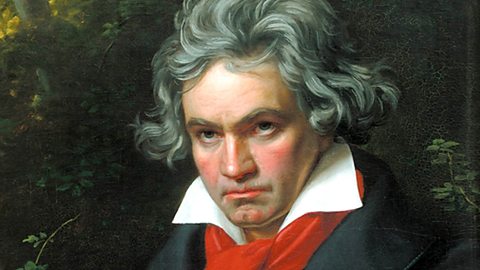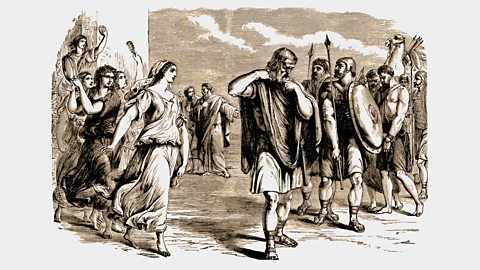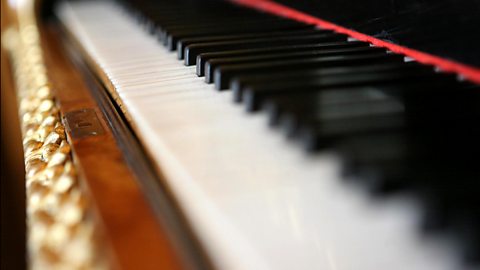10 pieces to make you cry

As everybody knows, weeping is terrifically good for the soul – and few things are as liable to make us tear up as a beautiful piece of music. Whether it's Leonard Cohen's Hallelujah or that dewy-eyed moment in The Lion King, there's something about that means a stray chord or heart-tugging melody can set our bottom lips a-wobble.
But there's more to it than that. Ever heard of Stendhal Syndrome – the phenomenon of being physically overcome in the presence of something of great beauty? Music certainly has power to move, and people do experience and tears of joy when hearing something that reaches deep into their hearts and minds.
What price "two for sorrow, one for joy" – or perhaps the other way round? Here are 10 pieces you can hear at this year's Proms which we think might move you to tears...
1. Beethoven – Ode to Joy (Symphony No.9)

Beethoven: Ode to Joy (9th Symphony)
With the �鶹������ҳ��� National Orchestra and Chorus of Wales conducted by Xian Zhang.
The words of the Ode to Joy were written by the German poet Friedrich Schiller in 1785. It's about people uniting in brotherhood, hence its adoption as the anthem of the European Community. Beethoven set it to music in his Ninth Symphony, which was commissioned in 1817 by the Philharmonic Society of London. Its celebration of freedom has underscored protests against the Pinochet dictatorship, against the Chinese government at Tiananmen Square and in celebration of the fall of the Berlin Wall. Coming at the end of a very long symphony, the Ode to Joy's heartfelt, soaring choral outburst is hugely uplifting.
You can hear Beethoven's 9th Symphony on Monday 19 August at 7.30pm at the Royal Albert Hall and on �鶹������ҳ��� Radio 3.
2. Berlioz – The Shepherds' Farewell (L'enfance du Christ)

Berlioz: The Shepherds' Farewell (L'enfance du Christ)
With the �鶹������ҳ��� National Orchestra and Chorus of Wales conducted by Sir Andrew Davis.
In The Childhood of Christ, Berlioz delved back into his tender boyhood memories for this unusual oratorio. While it contains the terror of Herod's dream and the Holy Family's flight, it's also suffused with a gentleness not found in many of his works. On hearing the first completed performance of "The Holy Family at rest", Berlioz wrote to his sister: "It is really good, it is innocent and touching (do not laugh), in the style of the illuminations of old missals." Just before this music comes "The Shepherds' Farewell", easily the most famous chorus from the oratorio – the music has an affecting tune and a simple sweetness which has caused many a snuffle at carol concerts throughout the land.
You can hear L'enfance du Christ on Tuesday 14 August at 7pm, at the Royal Albert Hall and on �鶹������ҳ��� Radio 3.
3. Debussy – Prélude à l'après-midi d'un faune
Debussy had written a lot of music before he was 30 but nothing to match this "prelude" to Stéphane Mallarmé’s poem L’après-midi d’un faune ("The Afternoon of a Faun"). In this work Debussy has created an evocative tone-poem which closely depicts the lascivious thoughts of a sleepy faun. Debussy's languorous reverie fired up a stylistic revolution and gained notoriety when Nijinsky choreographed it for Diaghilev's Ballets Russes. The opening flute solo is definitely weep-worthy.
You can hear L’après-midi d’un faune on Wednesday 24 July at 7.30pm at the Royal Albert Hall and on �鶹������ҳ��� Radio 3.
4. Handel – Angels, waft her through the skies

Handel: Waft her angels, through the skies (Jephtha)
With Robert Murray and the Orchestra of Welsh National Opera, conducted by Paul Goodwin.
In Handel's final oratorio, Jephtha has led his people through war to a great victory, but there is a terrible catch. Before battle commenced, Jephtha rashly made a vow that, if he were to win, he would sacrifice the first person he encountered on his return. To his horror, his beloved daughter Iphis is the first to greet him on his homecoming... In this heart-breakingly beautiful aria (you have to suspend disbelief...) Jephtha, preparing to take her life, prays that his daughter may be received into heaven...
You can hear Handel's Jephtha on Friday 30 August at the Royal Albert Hall and on �鶹������ҳ��� Radio 3.
5. Rachmaninov – Variation 18 (Paganini Rhapsody)

Rachmaninov: Variation 18 (Rhapsody on a theme of Paganini)
With Yevgeny Sudbin and the �鶹������ҳ��� National Orchestra of Wales conducted by Thierry Fischer
For many people, the ultimate "weepie" is the 1945 British romantic drama film, Brief Encounter, starring Trevor Howard and Celia Johnson. The yearning emotions of the movie were captured by director David Lean's prominent use of the slow movement of Rachmaninov's 2nd Piano Concerto. But the Russian composer's inventiveness when writing a tune we'd call "romantic" was unrivalled – Variation 18 from the Paganini Rhapsody is another of those achingly beautiful moments. Box of tissues, anyone?
You can hear Rachmaninov's Rhapsody on a Theme of Paganini at 7.30pm on Monday 5 August at the Royal Albert Hall and on �鶹������ҳ��� Radio 3.
6. Mendelssohn – Auf Flügeln des Gesanges

Mendelssohn: On Wings of Song
Auf Flügeln des Gesanges, with Soraya Mafi (soprano) and Simon Lepper (piano).
It's an earworm – the charming simplicity and soaring melody of Mendelssohn's 1834 Heinrich Heine setting made the song a hit across six continents. "On Wings of Song, my love, I carry you away, Away to the fields of the Ganges, Where I know the most beautiful place. There is a garden of red flax, in the quiet moonlight; the lotus flowers await their charming little sister..." When performed by a great singer who understands that less is more, you might find yourself dabbing your eyes.
You can hear Auf Flügeln des Gesanges on Monday 19 August in Proms at Cadogan Hall, and on �鶹������ҳ��� Radio 3.
7. Elgar – Cello Concerto
Written amid the dying embers of the First World War, this autumnal piece by a composer who knew his time was passing has none of the pomp and swagger of his earlier output. Commencing with a stormy series of cello chords underscored by suspenseful orchestral murmurings, the Cello Concerto builds to a soaring series of wistful melodies, reflecting Elgar's sense of despair at a world that was passing. The slow third movement, by turns hopeful and anguished, plucks at your heart strings like almost nothing else. Perhaps his most nakedly autobiographical work, it's a tragic masterpiece.
You can hear Elgar's Cello Concerto at 7.30pm on Tuesday 22 August at the Royal Albert Hall and on �鶹������ҳ��� Radio 3.
8. R. Strauss – An Alpine Symphony
Out of the lowest depths of the orchestra, murmurs arise, daylight gathers in the brasses, and then, all of a sudden, the sun appears in full orchestral blaze. Dawn arrives and so begins music's most vividly depicted mountainous ascent. With waterfalls, glaciers, an ear-splitting storm – and cowbells, the whole of nature is evoked in music so brilliant and immersive, you might just burst into tears.
9. Vaughan Williams – Fantasia on a theme of Thomas Tallis
When Vaughan Williams wrote his Tallis Fantasia in 1910, he changed the course of British music. Here at last was a piece of music which was no longer under the influence of the German musical culture which had attracted so many British composers in the 19th century. Here, Vaughan Williams was drawing on old English hymn tunes and folk idioms for his themes. As the evocative string music of Tallis's Fantasia builds to a climax, some say it brings them solace and hope in times of tragedy.
You can hear Vaughan Wiliiams's Fantasia on a Theme by Thomas Tallis at 7pm on Thursday 29 August, at the Royal Albert Hall and on �鶹������ҳ��� Radio 3.
10. Wagner – Prelude and Liebestod from Tristan und Isolde
Finally, the mother and father of all tear-jerkers. It really doesn't get more romantic – and sad – than the story of Tristan and Isolde, whose doomed love potion-induced romance results in him dying in her arms after which she expires in a "love-death" of grief. The climax of Wagner's opera is almost unbearably poignant, with music capable of turning on the waterworks above the stiffest of upper lips. Moreover, the orchestra-only version, which is a graphic musical depiction of a passionate encounter, has exactly the same effect.
Interesting facts: Mark Twain "cried the night away" after seeing the opera; Emmanuel Chabrier was already sobbing during the prelude. In fiction the fragile heroine of Thomas Mann's 1903 novella "Tristan" dies after the emotional and sexual arousal caused by the opera and in fact the first singer to play Tristan – the spendidly-named Ludwig Schnorr von Carolsfeld – died six weeks after its premiere.
You can hear the Prelude and Liebestod from Wagner's Tristan und Isolde at 7pm on Wednesday 7 August, at the Royal Albert Hall and on �鶹������ҳ��� Radio 3.
Enjoy the �鶹������ҳ��� Proms to the full
-
![]()
�鶹������ҳ��� Proms 2019
Explore the �鶹������ҳ��� Proms 2019 season: full details of all the concerts and broadcasts.
-
![]()
�鶹������ҳ��� Proms in the Park
Find full details of Proms in the Park, in London, Wales, Northern Ireland and Scotland.
-
![]()
Proms on TV, radio and online
Enjoy the Proms how and when you like.
-
![]()
�鶹������ҳ��� Radio 3
�鶹������ҳ��� Radio 3 – the home of the Proms on Radio. Every concert is broadcast live.





